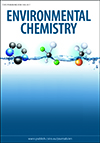Ying Chen (Ed.) (Fudan University, China)
Honghai Zhang (Ocean University of China)

Environmental Chemistry
Volume 18 Numbers 5 & 6 2021
RESEARCH FRONT: Fluxes and Chemistry of Marine Biogenic Volatile Organic Compounds
Environmental context. The ocean-produced dimethyl sulfide (DMS) molecule is thought to affect cloud formation and the solar radiation budget at the Earth’s surface, hence playing an important role in regulating climate. In this study, we calculated the DMS sea-to-air flux across the Southern Ocean, south-east Indian Ocean and north-west Pacific Ocean, and analysed the influence of DMS fluxes on sulfate aerosols. These results improved our understanding of the effects of DMS emissions on sulfate compounds in the atmosphere over the global ocean.
Environmental context. Dimethyl sulfide is an important biogenic gas, released from ocean to atmosphere, which contributes to aerosol formation and can therefore affect global climate. Studies on dimethyl sulfide in both seawater and atmosphere have linked the atmospheric chemistry of dimethyl sulfide with its circulation in the marine environment. This study showed that these biogenic emissions contribute to the sulfur cycle and particulate production, deepening our understanding of their role in the East China Sea.
Environmental context. Blooms of Ulva prolifera have recurred annually in the Yellow Sea since 2007, causing economic losses and severe ecological problems. We conducted laboratory incubation experiments to examine the effects of temperature and nutrients on its biogenic sulfur emissions during its decline period. Increasing temperature and nutrients affected the decay of U. prolifera, resulting in respective decreased and increased emission of biogenic sulfur compounds.
Environmental context. Atmospheric trace gases called volatile halocarbons (VHCs) significantly contribute to ozone depletion and global warming. The oceans are a primary source of VHCs, and concentrations and fluxes of selected VHCs in the Yellow Sea and East China Sea were measured. These data, and the influence of marine environmental factors on these parameters, provide information which will permit the assessment of the marine contribution of VHC behaviour and impact.
Environmental context. Organobromine compounds are a potential environmental hazard, but there are many uncertainties about their natural sources. This paper investigated the photochemical generation of bromophenols in the presence of dissolved organic matters (DOMs) and proxies, and demonstrated that DOMs enhance the photobromination reaction. The result indicates that the bromination process induced by sunlit DOMs likely contributes to the natural sources of organobromine compounds in the marine environment.
Environmental context. Marine-derived non-methane hydrocarbons (NMHCs) are thought to affect atmospheric oxidation balance and aerosol formation, hence playing an important role in regulating climate. In this study, we report the distributions and sea-to-air fluxes of 10 NMHCs in the East China Sea (ECS), and assess the roles of phytoplankton assemblages in the occurrence and emission of NMHCs in the ECS. The results will improve our understanding of the biogeochemical cycling of NMHCs in marine systems.
Environmental context. Methane and nitrous oxide play a significant role in climate change, while the variation in fluxes in mangrove-dominated coastal wetlands is a key uncertainty in the production of these gases. Field studies measuring the fluxes of these gases in a specific coastal mangrove were conducted and revealed complex seasonal behaviors. Methane emissions to the atmosphere were significant, while nitrous oxide emissions were less so, but are likely to increase where nutrient levels increase.
Environmental context. Amines in the atmosphere play important roles in atmospheric chemistry and have potential climate effects. We characterise the concentrations, size distributions and chemical pathways of aerosol aminiums over a coastal city and marginal seas, and estimated the contribution of marine biogenic sources. This study can facilitate our understanding about the interactions between human activities, biogenic emissions and the atmospheric environment.
Environmental context. Water soluble ions (WSIs) in aerosols, especially in marine secondary aerosols, can participate in the formation of cloud condensation nuclei (CCN) in the marine boundary layer, which can affect global climate. In our study, in-situ gas and aerosol compositions were analysed to explore the formation paths and forms of secondary aerosols in the Southern Ocean (SO) in summer. Our study provided novel data on these formation mechanisms of secondary aerosols in the SO, with potential impacts on our understanding of global climate change.